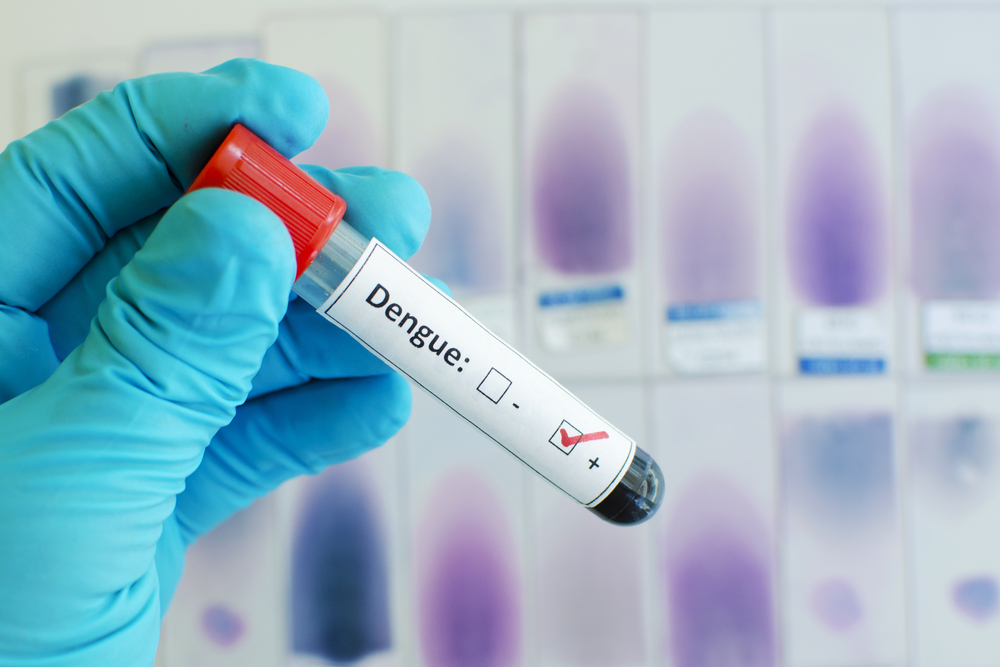
With monsoon rains sweeping through the country, there’s been a concerning surge in dengue cases reported in various regions. Health officials are on high alert as the number of infections continues to climb, affecting communities from urban centers to rural areas.
According to recent reports, cities Karnatake, Kerala, Tamilnadu, Andgra Pradesha and Maharashtra have seen a significant uptick in dengue cases compared to previous years. This spike has put immense pressure on local hospitals and healthcare systems, prompting authorities to step up preventive measures and public awareness campaigns.
Stay tuned as we delve deeper into dengue fever, its symptoms, tests to diagnose and explore what individuals and communities can do to protect themselves from this mosquito-borne illness.
What Is A Dengue Fever?

Dengue fever: Dengue is a viral infection caused by the bite of female Aedes Aegypti mosquito. There are four serotypes (different types within a species of virus) of dengue virus. Infection with any one of the serotypes confers lifelong immunity from that particular strain but only partial protection against the others. At present, type 1 and type 2 strains are widespread in India.
It is possible to get dengue more than once. There are 4 different but related strains of the dengue virus. Being affected by one strain offers no protection against the others.
How Does Dengue Spread?

Mode of transmission: Dengue fever is spread by Aedes Aegypti mosquito that breeds in stagnant water. The mosquito that causes dengue can be identified by characteristic black and white markings over its body. Usually, it bites on the legs and arms and is most commonly seen during the daytime.
Explore our range of mosquito repellents to protect yourself.
Is Dengue Infectious?
Dengue fever does not spread by touch, cough or secretions. But the spread of dengue from a patient to others is possible through a mosquito bite. The patient should be protected from contact with the mosquito by ensuring he sleeps under a bed-net and prevents the entry of mosquitoes into his/her house.
What Are The Symptoms Of Dengue Fever?
Dengue fever should be suspected if you have a sudden onset of high-grade fever with:
-Fever as high as 104℉
-Severe headache
-Pain behind the eyes
-Decreased appetite
-Weakness
-Body aches
-Skin rash
-Vomiting
-Abdominal pain
The fever can last for 5-7 days & usually decreases around the 3rd to 7th day of illness. This is followed by marked fatigue which can last for a few days to weeks. This marks the beginning of the critical phase where there could be a rapid decrease in the platelet count.
What Is Dengue Hemorrhagic Fever?
Dengue hemorrhagic fever: In rare cases, a more severe life-threatening disease called dengue hemorrhagic fever can also occur. It results in bleeding due to blood plasma leakage and in rare cases can cause dengue shock syndrome.
The World Health Organization has laid down criteria for a diagnosis of dengue hemorrhagic fever. These are
a. Low platelet count (<1 lac)
b. Fever for 2 to 7 days
c. Hemorrhagic manifestations: It is important to monitor the platelet count and be watchful of danger signs (bleeding, rash, abdominal pain or vomiting), which usually lasts for 2-3 days.
How to Diagnose Dengue Fever?
Some of the important tests to diagnose dengue fever are:

A) Direct Tests
1. Dengue NS1 Antigen
This test is performed early in the course of infection, usually within the first 5 days of the onset of symptoms. This is because NS 1 antigen starts to appear from the very first day of dengue infection and may be present for up to 5-7 days. Thereafter, it starts disappearing from the body and may therefore indicate false-negative results.
2. Dengue RT-PCR test
This test is also used to detect dengue virus in the early course (first 5 to 7 days) of the infection. It detects the viral genome (the genetic material of the virus) in the blood. This test is around 90% sensitive and 95% specific against the infection. This is the most sensitive and specific test suggested to be taken in the initial phase of the infection.
The dengue PCR test should be done within 5 days after the symptoms start to appear.
B) Indirect Tests
1. Immunoglobulin M (IgM) test for Dengue
This test detects IgM (antibodies) in the blood, which appear in the initial phase of the disease, and signifies acute infection or recent infection. It is advised to undergo a dengue antibody IgM test if you experience the symptoms of dengue continue for more than 5 days. It is usually done after the 4th day of the occurrence of the symptoms as the antibodies start developing after 4-5 days of infection.
Note:
-In the 1st week of the onset of symptoms, dengue PCR test and NS1 antigen are recommended.
-Between the 3rd to 9th day, a combination of NS1 antigen/ PCR and IgM antibodies is recommended.
2. Immunoglobulin G (IgG) test for Dengue
The test is used to detect infection in the later course of the disease because the level of IgG which is to be monitored in the test tends to increase slowly. Usually, IgG antibodies are detectable in low quantities starting around 14-21 days of the infection, after which they slowly increase. These antibodies can remain in the blood for around 90 days and in some cases may remain for the rest of your life.
You can get an IgG antibody test for dengue after 14-21 days of infection or even later as these antibodies remain in the blood several months post infection. The presence of IgG antibodies signifies previous infection, recovery after dengue or post vaccination against dengue.
3. Complete Blood Count
Dengue is frequently associated with decreased platelet count (normal platelet count lies in the range of 1.5 to 4 lacs). Therefore, platelet count should be monitored carefully and regularly, especially when the fever comes down.
If a patient is positive for dengue-specific antigen, a decrease in platelet count and a decrease in total white blood cells (WBC) count may be seen. But, it is important to know that diagnosis of dengue does not depend solely on platelet counts.
How Is Dengue Treated?
There is no specific treatment method for dengue.

-Instead, the treatment is aimed at relieving the symptoms. For example, fever can be treated with antipyretic drugs like paracetamol to bring down the temperature and also relieve body aches.
-Drugs such as aspirin and ibuprofen should be avoided as they may increase the risk of hemorrhage. Antibiotics are not required.
-Most patients with dengue fever have mild illness and will not require hospitalization and can be treated at home by following strict dietary guidelines and course of medication. However, at times, it may cause a potentially serious complication, called severe dengue.
How Should Dengue Be Managed At Home?

Follow the simple tips to manage dengue at home:
-People suffering from dengue fever should take adequate rest, eat a healthy diet and monitor their platelet count closely.
-Patients should drink lots of fluids (3-4 liters) to prevent dehydration, which is a common symptom in dengue.
-Few home remedies like papaya leaves and kiwi are also quite popular in the treatment of dengue fever as they have been known to increase the platelet count. However, there is no research study to prove their efficacy in increasing the platelet count.
-It is important to be watchful of any danger signs (bleeding, rash, abdominal pain or vomiting). One must follow up with their doctor on a regular basis and get immediate medical help in case of any health complications.
When Does A Patient Need To Be Hospitalized?
The patient is usually admitted if he is dehydrated, bleeding or shows any danger signs that require hospitalization. The patient is generally not admitted if the platelet count is above 50,000. The platelet transfusion is generally given if the platelet count is less than 10,000 in absence of bleeding manifestations.
A Quick Checklist To Help You Out!
Follow these handy quick tips if you or your loved one is suffering from dengue:
-Ensure that the patient takes 3-4 liters of fluids (water, juice, tea, milk or soup) a day.
-Keep a close watch on signs of dehydration. Check the patient’s tongue and urine output.
-The tongue should appear moist and pink in color. The patient should pass adequate urine (every 3 hours).
-If the patient can’t take enough fluids orally and his urine output is less, he/she should be admitted to a hospital for intravenous fluids
-The blood tests should be started when the fever starts.
-In the early stages, the platelet count is usually within normal range but hemoglobin level may be high.
-If the hemoglobin level is raised ( >14g/dL), a doctor should be consulted even if the platelet count is in the normal range.
-The platelet count begins to fall once the fever starts to come down.
-Remember that even when the platelet count is falling, there is no need to panic. Talk to your doctor to know if you need to be hospitalized or any other precautions have to be taken.
-There is no role of platelet transfusions in a patient who has no active bleeding. Do not insist the doctor for platelet transfusion in the absence of bleeding because your doctor knows the best treatment suitable for you based on your condition.
Take precautions to prevent mosquitoes from breeding in and around your homes. If anyone in your family develops a sudden, high-grade fever with body aches and joint pains, please consult a doctor for early detection and proper management of dengue fever.
(The article is written by Monalisa Deka, Senior Health Content Editor and reviewed by Dr. Rajeev Sharma, Vice President (Medical Affairs))
Recommended Reads:
6 Effective Ways To Prevent Dengue
5 Natural Mosquito Repellents You Must Try To Prevent Dengue
References:
Dengue. Questions and Answers. The World Health Organization (WHO). https://www.who.int/immunization/research/development/dengue_q_and_a/en/